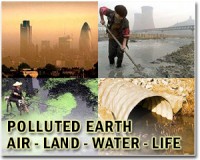 |
Washington (AFP) July 21, 2010 Despite proven links to cancer, a ban in the European Union and four other countries, and damning scientific studies, asbestos is still selling like hotcakes in the developing world, a report said Wednesday. An investigation conducted by the International Consortium of Investigative Journalists and the BBC found that the asbestos industry has ignored waves of asbestos-related disease that have led to bans or restrictions in 52 countries, and continues to ply the mineral in developing nations. More than half of the two million metric tonnes of asbestos that were mined worldwide in 2009 was exported to developing countries like India and Mexico, where demand is high for cheap building materials, the report said. Most of the asbestos sold in those countries is used in cement for corrugated roofing, in water pipes and for home construction. A key reason for the buoyant sales is that asbestos is cheaper than alternative materials such as polypropylene fiber cement, steel-reinforced concrete pipes and aluminum roof tiles. In India, the second largest asbestos market in the world after China, nearly 350,000 metric tons of the mineral were used in 2008, and asbestos use has risen by 83 percent since 2004, the report said. "The really unfortunate part is that, though they know it's dangerous, they still live with it because it's cheap and abundant," said Murali Krishnan, an Indian reporter who worked on the nine-month investigation. The World Bank last year told borrowers it expects them to use alternatives to asbestos whenever possible. But the asbestos industry has continued to grow, thanks to a "marketing campaign involving a global network of industry groups led by the Canadian government-backed Chrysotile Institute," said David Kaplan, director of the ICIJ. Chrysotile is another name for the most common type of asbestos, white asbestos. "We found institutes and trade centers in Montreal, Mexico City, New Delhi and elsewhere that are sharing information and coordinating public relations initiatives to promote the 'controlled use' of chrysotile or white asbestos which is the only form of the mineral used today," Kaplan said. Canada, which has asbestos mines but uses almost no asbestos within its borders, became a leader in the global pro-asbestos movement in the 1960s when studies that tied the mineral to cancer threatened to shutter mines in Quebec. The Montreal-based Chrysotile Institute promotes the "controlled" use of asbestos in construction and manufacturing, a concept the report said is "elusive in developing countries," where worker safety regulations are lax and more and more people are being exposed to asbestos. The industry campaign is likely to result in epidemics of asbestos-related diseases within the next decade, with the biggest users, China and India, the hardest hit by the mineral's devastating health effects, said Kaplan. Researchers in India have estimated that deaths from asbestos-related cancers could reach one million in developing nations by 2020, while an Australian researcher has predicted five to 10 million deaths from cancers caused by asbestos exposure by 2030. Finnish researchers estimated that 10,000 to 15,000 people will die in China each year by 2035 of asbestos-related ailments. Currently, the death toll from asbestos-related diseases is estimated by the International Labor Organization to be 100,000 worldwide.
Share This Article With Planet Earth
Related Links Our Polluted World and Cleaning It Up
 China uses oil-eating bacteria to clean up spill
China uses oil-eating bacteria to clean up spillBeijing (AFP) July 20, 2010 Authorities in China are using over 23 tonnes of oil-eating bacteria to help clean up an oil spill in the Yellow Sea caused by a pipeline explosion and fire at the weekend, state media said Tuesday. Yang Jiesen, head of the research and development division of a Beijing biotechnology company, said the Maritime Safety Administration had placed its order for the bacteria on Saturday, the offic ... read more |
|
| The content herein, unless otherwise known to be public domain, are Copyright 1995-2010 - SpaceDaily. AFP and UPI Wire Stories are copyright Agence France-Presse and United Press International. ESA Portal Reports are copyright European Space Agency. All NASA sourced material is public domain. Additional copyrights may apply in whole or part to other bona fide parties. Advertising does not imply endorsement,agreement or approval of any opinions, statements or information provided by SpaceDaily on any Web page published or hosted by SpaceDaily. Privacy Statement |